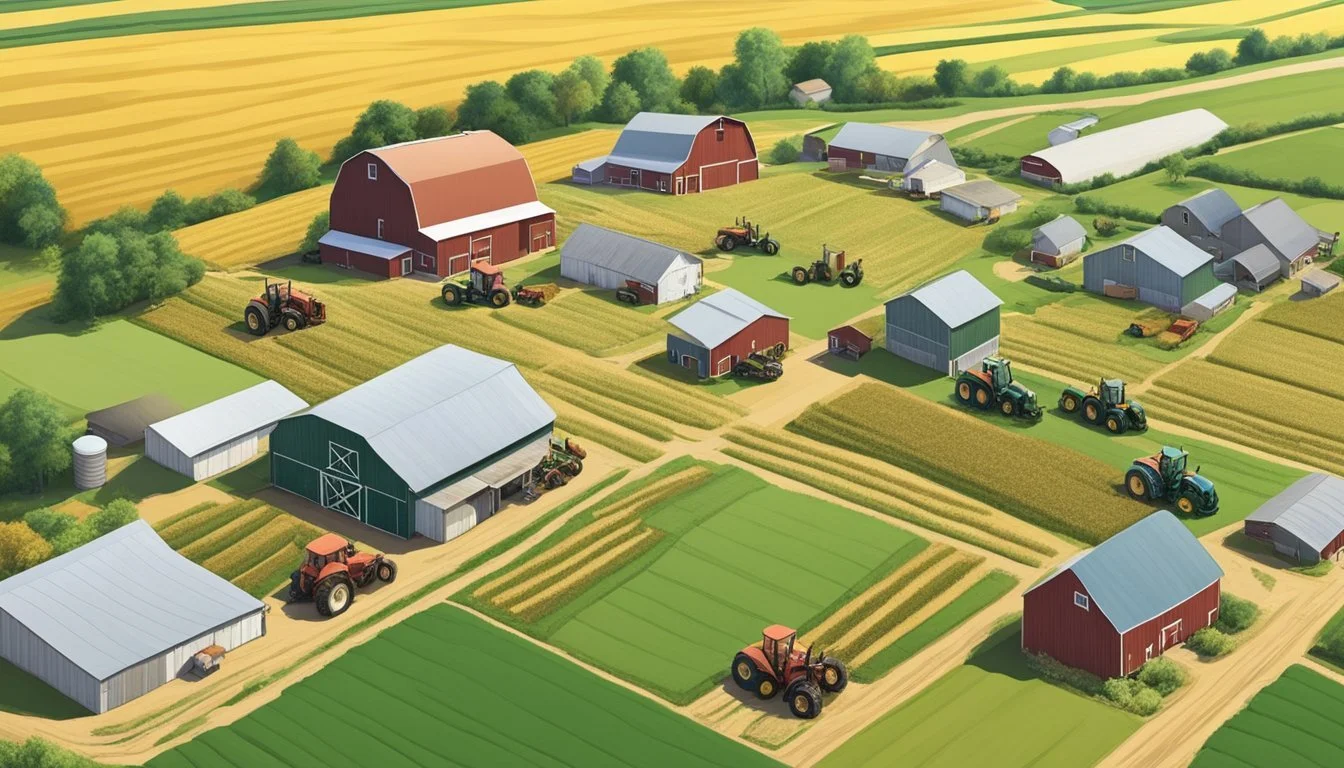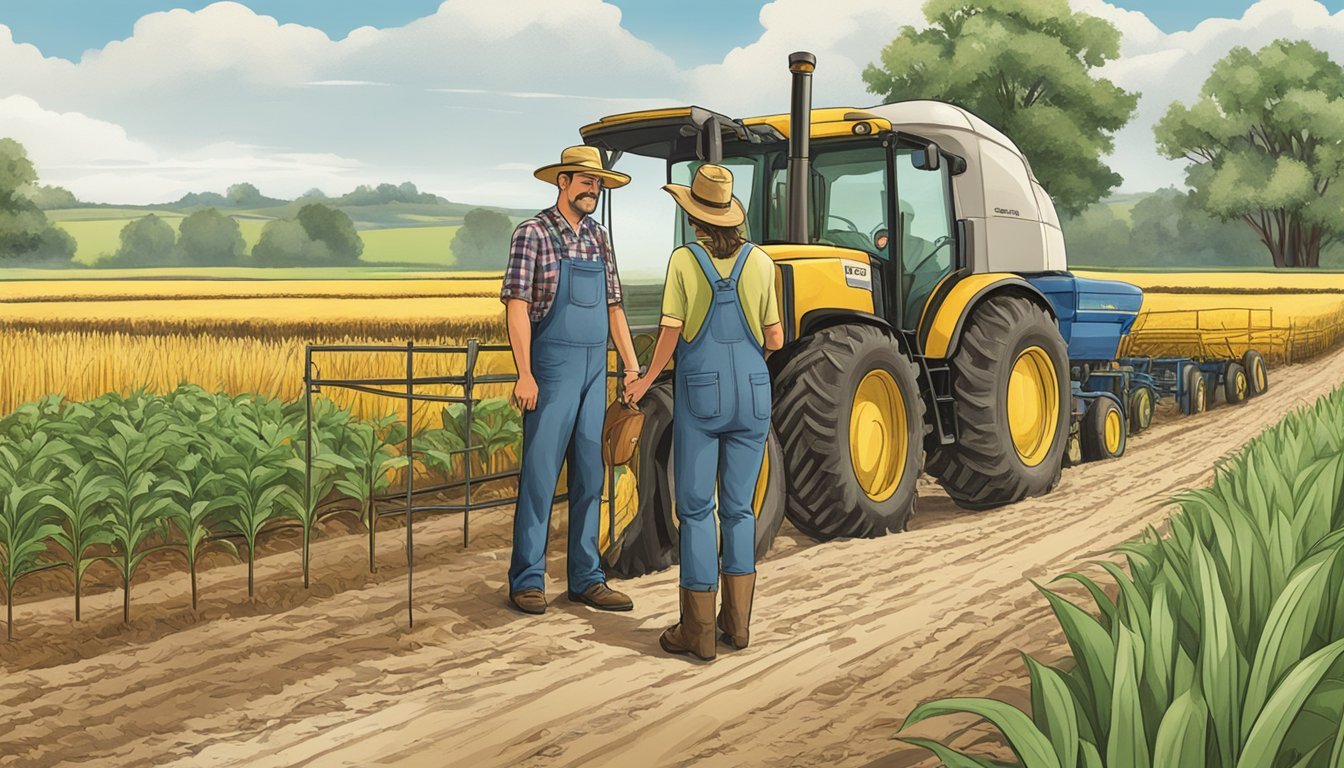Farming Grants Iowa
Opportunities for Agricultural Advancement
Iowa offers a range of programs and grants aimed at fostering the agricultural sector, particularly for new and existing farmers looking to enhance their operations and contribute to the state's robust agro-economy. These initiatives are designed to support farmers in various stages of their careers, with a special emphasis on beginning farmers who face unique challenges when entering the field. The Iowa Beginning Farmer Loan Program, for example, helps new farmers to acquire agricultural property, equipment, and livestock, simplifying the transition into agricultural business ownership through financial assistance.
Grants and funding opportunities, such as the Choose Iowa value-added grants, serve to increase the production and availability of Iowa-grown and raised products. By providing financial backing for the purchase of labor-reducing technology and on-farm processing equipment, these grants aim to improve efficiency and promote innovation on Iowa farms. This economic support not only bolsters the success of individual farming operations but also contributes to the overall sustainability and growth of Iowa’s agricultural sector.
Overview of Farming Grants in Iowa
The Iowa Department of Agriculture and Land Stewardship administers a variety of grants aimed at supporting farmers and promoting agricultural innovation within the state. These grants provide financial assistance for projects that enhance the competitiveness of specific crops, as well as those increasing the diversity and accessibility of Iowa’s agricultural products.
Choose Iowa Grants: Aimed at assisting farmers, businesses, and non-profits, these grants offer up to $25,000 to match project costs that focus on expanding or diversifying agricultural product offerings.
Dairy Farm Technology Grants: With a pool of $750,000, these grants support producers in purchasing labor-reducing technology and on-farm processing equipment, with individual grants possibly reaching up to $100,000, requiring a 1:1 financial match from the recipient.
Specialty Crop Grants: The state offers financial support exceeding $334,000 for projects that stimulate demand for Iowa's specialty crops.
Additionally, the Value-Added Producer Grant (VAPG) program assists producers in entering value-added activities, which can lead to the creation of new products, enhanced marketing opportunities, and increased income for producers. Prioritization may be given to beginning farmers or ranchers.
The Specialty Crop Block Grant Program encourages applications for federal funding to build the supply of 'Choose Iowa' products, showing the state's commitment to meet the growing consumer demand for local foods and crops.
These grant programs create opportunities for agricultural diversification and economic growth, helping Iowa's farmers to innovate and thrive in a competitive market.
Getting Started: Resources for New Farmers
New farmers in Iowa have a robust support system through various programs and educational resources designed to facilitate their entrance into the agricultural sector. These initiatives help beginning farmers acquire land, gain essential knowledge, and create successful farm businesses.
Beginning Farmer Programs
The Iowa Agricultural Development Division (IADD) offers significant incentives to new farmers. The division's Beginning Farmer Loan Program is tailored to assist them in acquiring agricultural property. It does this by providing financing at reduced interest rates, making it more feasible for individuals to start their farming operations. Additionally, the IADD extends tax credits to landowners who lease land to beginning farmers, encouraging established farmers to support the next generation.
Education and Training Opportunities
Education plays a crucial role in the success of new farmers. As such, Iowa State University offers numerous training programs aimed at the development of farming expertise. These programs cover various aspects of agricultural business, from crop and livestock management to marketing and financial planning. Besides formal education, new farmers also have access to mentorship and networking opportunities, which allow them to learn from those with extensive experience in the field.
New farmers benefit significantly from the dedicated support offered in Iowa, with resources spanning financial assistance to comprehensive education and training.
Financial Assistance and Investment
The Iowa farming sector benefits from various financial assistance programs, encompassing grants, loans, and tax credits, all tailored to fuel growth and sustainability within the industry.
Grant Opportunities and Financial Incentives
Grant Funding: Farms and agricultural businesses in Iowa can apply for Choose Iowa Dairy Innovation Grants to increase or diversify product offerings, expand markets, and shorten the supply chain. These cost-share grants stimulate additional private investment. Financial incentives for Iowa farmers also include grant programs accessible through Grants.gov, which provide various funding for agricultural projects and research.
Loan Programs for Farmers
Beginning Farmer Loan Program: Designed to aid newcomers in agriculture, the program helps new farmers in Iowa to acquire agricultural property. Alongside, loan participation programs work to afford farmers more substantial access to capital through reduced interest rates, ultimately facilitating the purchase of land and equipment.
Maximum Loan Amount: $300,000
Target Demographic: Beginning and socially disadvantaged farmers
Tax Credit Programs for Agricultural Advancement
Iowa farms can benefit from several tax credit programs:
Custom Farming Tax Credit Program: Offers incentives for custom farming operations.
Federal Tax-Exempt Bonds: Provides favorable financing options for qualifying agricultural investments.
These programs are designed to encourage investment into the state's agricultural economy and optimize the fiscal environment for farm-related businesses.
Farm Management and Business Strategy
In the realm of farming in Iowa, grants are enabling agriculturalist to refine their business practices and asset management. The strategic planning and effective handling of assets are crucial for sustainable and profitable operations.
Business Planning and Strategy
A farmer's success is heavily reliant on a robust business plan that identifies avenues to diversify revenue streams and evaluates risks. Grant opportunities in Iowa encourage farmers to invest in technologies that alleviate labor demands and increase efficiency. For instance, grants up to $100,000 can be used to acquire labor-saving technology, bolstering a farm’s strategic positioning in the market.
Land and Asset Management
For landowners and agricultural asset owners, managing their assets effectively includes exploring leasing options and modernizing farm equipment. A 1:1 match requirement for grants signifies that landowners must be financially invested, which promotes careful planning in asset utilization. Moreover, these grants aid in demand growth for specialty crops, revealing a trend towards diversifying crop production as a strategic management approach.
Agricultural Practices and Environmental Stewardship
Agriculture in Iowa is evolving with a stronger emphasis on environmental stewardship. Specific practices focus on maintaining soil health, water quality, and energy efficiency, and illustrate the state's commitment to sustainable agriculture.
Soil Health and Conservation Practices
Soil health is the foundation of productive agriculture and environmental stewardship in Iowa. The utilization of cover crops is an essential conservation practice to enhance soil quality and prevent erosion. Farmers are encouraged to adopt:
No-till farming: This helps in maintaining soil structure, reducing erosion, and increasing water infiltration.
Cover cropping: Planting cover crops, such as rye or clover, keeps the soil covered during off-seasons which reduces nutrient runoff and soil erosion.
Sustainable Water and Energy Use
Farmers in Iowa are implementing strategies to improve water quality and conserve resources. Assessments and upgrades to irrigation systems ensure water is used effectively. Key measures include the following:
Precision irrigation: Using technology to apply water and nutrients efficiently and only where needed.
Renewable energy sources: Solar and wind installations on farmland reduce reliance on non-renewable energy resources, mitigating the environmental footprint of farming operations.
Crop and Livestock Production
Agricultural success relies heavily on the efficient production of both crops and livestock. This section intimately examines the intricacies of crop cultivation alongside the systematic approach to livestock care and breeding that underpin Iowa's farming grants.
Crops: Growing and Harvesting
In Iowa, the process of growing and harvesting crops such as corn and rye is optimized through strategic use of resources. Corn, standing as one of the staple crops, benefits from the judicious application of fertilizer that ensures healthy growth during the crop's critical stages. The state's grant programs often support innovative farming methods that promise increased yield and sustainability.
Key Crop Planting Season Harvesting Period Corn April - May September - October Rye August - October July - August
Corn harvest is a critical economic activity in Iowa, requiring precise timing to maximize output and quality.
Livestock Care and Breeding
Livestock care in Iowa is another foundational sector, with a particular focus on breeding livestock to meet specific market demands. Programs that enhance breeding techniques ensure genetic diversity and optimal health, consequently bolstering the dairy and meat industries. Dairy farms emphasize rigorous health protocols and breeding strategies to uphold the highest quality of milk production.
Breeding Goals
Genetic variety
Increased milk yield
Disease resistance
Constant innovation in breeding and care practices ensures the livestock sector remains robust and productive.
Local Food Systems and Community Engagement
Iowa’s efforts to enhance local food systems are structured around community engagement and bolstering local businesses involved in food processing and production. This focus on supporting a resilient local food ecosystem encourages the community to choose Iowa-grown and processed foods, fostering a sustainable environment for local producers and consumers alike.
Supporting Local Food Businesses
Iowa’s local food businesses, including producers and processors, benefit from grant opportunities designed to strengthen food infrastructure. State initiatives, like the Iowa Resilient Food Systems Infrastructure Program, allocate funds for infrastructure and equipment grants. Specifically:
Infrastructure Grants: Made available to enhance the processing capabilities of local food businesses.
Equipment Only Grants: Aimed at providing the necessary tools for food businesses to operate more efficiently.
The goal is to create a robust local food system that supports Iowa's economy and provides resilience against supply chain disruptions.
Community Involvement and Communication
The success of local food systems hinges on active community involvement and transparent communication. Programs by Iowa State University Extension emphasize:
Deep Community Engagement: Necessary for empowering communities and establishing trust.
Research and Coalition Building: These are the pillars for understanding and achieving the health and food system goals within the community.
Furthermore, community initiatives like the one in Johnson County are a response to shifts in food system dynamics, where funding from the American Rescue Plan Act supports the local food landscape. These programs not only address immediate needs but also set the groundwork for enduring community-led food system transformation.







